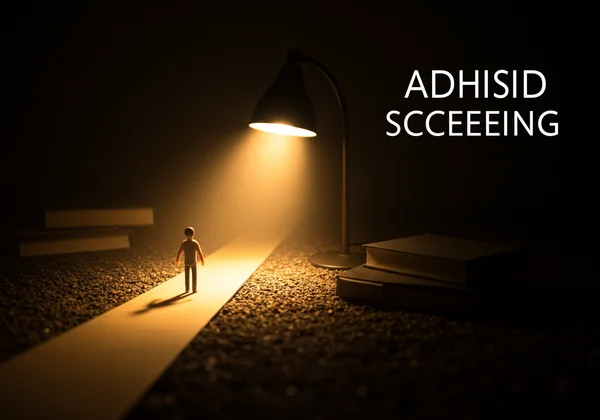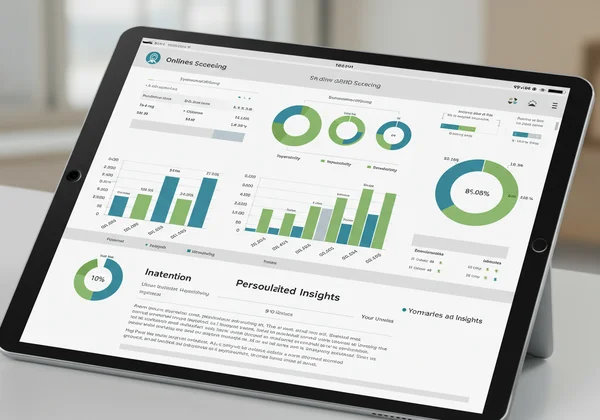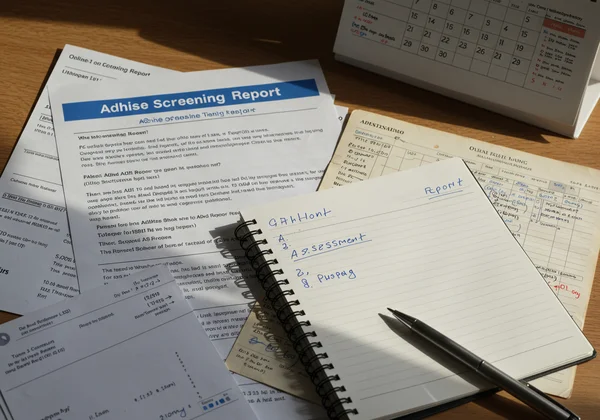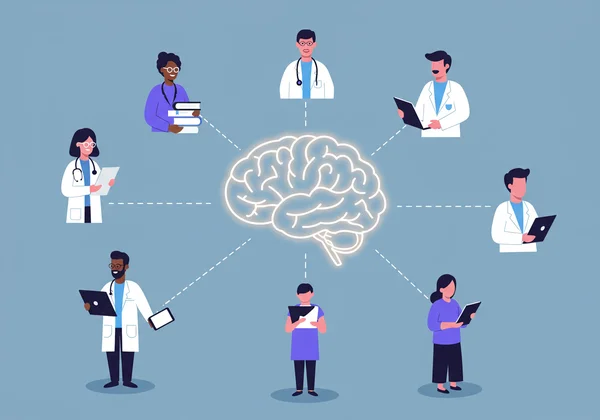ADHD 評估:線上篩查後的下一步
進行線上 ADHD 篩查 是了解自己或孩子的重要且勇敢的第一步。無論結果是證實了 您的 疑慮,還是引發了新的問題,感到解脫、焦慮和對接下來該怎麼做感到不確定,都是很常見的。您可能會想,ADHD 的典型評估是什麼? 本指南旨在引導您了解這個問題,為您邁向理解的道路提供清晰且支持性的路線圖。
將您的初步篩查想像成,在您曾於黑暗中摸索前進的房間裡,點亮了一盞燈。雖然它不會照亮每個細節,但它確實提供了對整體景象更清晰的看法。您所獲得的見解是寶貴的工具。現在,讓我們探討如何有效利用這些見解,邁向正式評估、獲得更深入的了解。如果您尚未踏出這第一步,您可以 從這裡開始您的旅程。

了解您的線上 ADHD 篩查結果
您在完成 線上 ADHD 評估 後收到的報告充滿了寶貴的資訊,但正確解讀它至關重要。重要的是要管理您的期望,並將報告視為一個強大的起點,而非最終目的地。這一步旨在識別與 ADHD 一致的模式和特徵,為更全面的評估奠定基礎。
解讀您的篩查報告:它意味著什麼(不意味著什麼)
首先,最重要的是要了解,線上篩查工具並非醫療診斷。將其視為一份有條理的自我報告經驗集合,其結構參考了臨床公認的標準,例如與 DSM-5 標準一致的成人 ADHD 自我評量表 (ASRS)。結果突出了您的經驗與常見 ADHD 特徵相符的領域。
您的報告 確實 意味著,您擁有紮實、有條理的數據,可以與醫療專業人員展開富有成效的對話。它將討論從模糊的「我認為我可能患有 ADHD」轉化為具體的陳述:「我完成了一項基於 ASRS 的篩查,結果表明我應該尋求正式評估。」這使您能夠有效地為自己爭取權益。它所 不 意味著的是,您已經獲得確診。正式診斷只能由合格的專業人員在全面的臨床評估後做出。

識別您報告中的潛在優勢與挑戰
一份好的篩查報告,特別是經過 AI 強化分析的報告,不僅止於給您一個分數。它還可以提供關於您獨特注意力模式和專注力的 個人化見解。請超越主要結果,仔細審查細節。您可能會注意到與注意力不集中、過動或衝動相關的特定模式,而這些模式是您以前未曾明確識別出的。
例如,您的報告可能會突出組織和時間管理方面的挑戰,但也可能指出潛在的優勢,例如創造力以及對您感興趣主題的過度專注。識別這些模式非常有價值。它幫助您了解 ADHD 不僅僅是缺陷的列表,而是一種不同的神經類型,擁有自己的一套優勢和挑戰。這種細緻入微的視角是邁向自我接納和有效管理策略的關鍵部分。
準備正式的 ADHD 評估:您的行動計劃
有了您的篩查結果,您現在準備好邁出 ADHD 診斷過程 的下一步。向專業人員尋求正式評估可能會令人望而生畏,但充分準備可以使體驗更順利、更富有成效。您的目標是向臨床醫生提供關於您的生活和挑戰的最清晰的圖像。
為您的醫生就診收集基本資訊
醫療專業人員需要的不僅僅是您的篩查結果來做出準確診斷。他們將尋找在不同環境中和長時間內持續存在的行為模式證據。在您的預約之前,請花一些時間收集以下資訊:
-
您的篩查報告:列印出 您的 ADHD 評估結果。這是一個完美的摘要,可以開啟對話。
-
具體生活範例:不要只說「我沒有條理」。提供具體範例:「我這個月已經錯過了三個重要的工作截止日期,因為我經常失去對時間的掌握」,或者「我孩子的老師報告說他們總是忘記交作業,即使作業已經完成了。」
-
童年資訊:對於成人評估,關於您童年的資訊至關重要。盡量回憶學業成績、成績單上的老師評語以及社交挑戰。如果可能,請向父母或年長的親戚詢問他們的回憶。
-
相關文件:學校成績單、過去的心理評估或工作表現評估可以提供長期挑戰的客觀證據。
-
問題清單:寫下您對 ADHD、評估過程或潛在治療的任何問題。

有效地向專業人員傳達您的經驗
許多人,特別是成人和女性,擔心他們的擔憂不會被認真對待。為了確保您被聽見,請專注於傳達您症狀的 影響。解釋這些挑戰如何影響您的工作、人際關係、財務和心理健康。
使用「我」開頭的陳述來描述您的經驗,例如「我對簡單的家務感到不知所措」,或者「我在會議中難以跟上對話」。誠實地說明您已經發展出的應對機制,因為這些有時可能會掩蓋您症狀的嚴重程度。請記住,您是自己生活的專家。您的篩查報告是支持您專業知識的數據,讓您有信心進行清晰直接的對話。
為您的 ADHD 旅程尋找合適的專業人員
選擇合適的醫療服務提供者是關鍵一步。並非所有醫生都接受過診斷 ADHD 的專業培訓,尤其是在成人方面。您需要一位了解該疾病細微差別並將進行全面評估的人。通常建議尋找 精神科醫師 進行 ADHD 評估,但他們並非您唯一的選擇。
診斷 ADHD 的醫療專業人員類型
有幾種類型的專業人員有資格診斷 ADHD。您尋找 ADHD 專科醫師 的過程可能會讓您遇到以下其中一種:
-
精神科醫師:專門從事心理健康的醫生。他們可以診斷 ADHD,提供治療,並開立藥物。
-
心理學家:擁有心理學博士學位的專業人員。他們擅長進行全面的心理測試和提供治療。
-
神經科醫師:專門研究大腦和神經系統的醫生。他們可以診斷 ADHD 並排除其他神經系統疾病。
-
基層醫療醫師 (PCPs):您的家庭醫生可以是一個很好的起點。雖然有些醫生對診斷和治療 ADHD 感到自在,但許多人會將您轉介給專科醫生進行正式評估。

選擇 ADHD 專科醫師時要問的關鍵問題
一旦您有了潛在的服務提供者,在預約之前不要害怕提問。這有助於確保他們適合您或您的孩子。請考慮詢問:
- 您在診斷成人/兒童/青少年 ADHD 方面的經驗是什麼?
- 您的正式評估過程涉及哪些內容?(它應該不僅僅是簡短的談話和處方)。
- 您是否使用標準化的評估工具並遵循 DSM-5 診斷標準?
- 您如何區分 ADHD 與焦慮症或憂鬱症等其他疾病?
找到一位傾聽、理解並擁有正確專業知識的專業人員將會產生巨大的影響。您對理解的追求值得一位稱職且富有同情心的引導者。請不要猶豫,從這裡開始 邁出第一步。
賦能您的前進之路:從篩查到支持
您已經完成了最困難的部分:您承認了您的擔憂並採取了行動。完成線上篩查是重要的一步,它將您從質疑之地帶向發現之路。旅程並未在此結束,但您現在已經具備了知識和工具,可以自信地走下去。
將您的篩查結果作為催化劑。讓它們賦予您力量,整理思緒,尋求正確的專業幫助,並為您的需求爭取權益。清晰度近在咫尺,了解您的大腦是釋放您全部潛力的關鍵。無論是為了您自己還是您的孩子,這都是一趟邁向支持、有效策略和更充實生活的旅程。今天就 開始您的評估 邁出這重要的一步。
關於 ADHD 篩查後步驟的常見問題
這項線上評估是正式的 ADHD 診斷嗎?
不,它不是。我們網站上提供的工具僅用於篩查目的。它們旨在幫助您識別您的症狀是否與 ADHD 一致,並提供一份結構化的報告以與醫療專業人員分享。正式診斷只能由合格的臨床醫生在全面評估後做出。
初步篩查後,ADHD 的典型評估是什麼?
典型的正式 ADHD 評估是一個多步驟的過程。它通常包括關於您的個人、醫療和家族史的詳細臨床訪談;對您的症狀及其如何影響您的生活進行審查;以及使用標準化評分量表或問卷。對於兒童,它通常涉及父母和老師的參與。
我如何找到合格的專業人員進行 ADHD 評估?
您可以先向您的基層醫療醫師尋求轉介,尋找精神科醫師或心理學家等專科醫師。您也可以向您的保險公司查詢網絡內的心理健康專業人員列表。來自美國精神醫學會或全國 ADHD 倡導團體等專業組織的線上目錄也可能是很好的資源。
如果我的線上篩查表明我有 ADHD 傾向,值得進行測試嗎?
當然。如果您的 線上工具 篩查結果表明您可能具有與 ADHD 一致的特徵,那麼進行正式評估是至關重要的一步。診斷可以提供巨大的清晰度和肯定,解釋您一生中的掙扎。更重要的是,它開啟了有效治療、療法和策略的大門,這些可以顯著改善您的生活品質、生產力和人際關係。
免責聲明:本文僅供參考,不構成醫療建議。所提供的資訊不能替代專業醫療建議、診斷或治療。對於任何醫療狀況的疑問,請務必諮詢您的醫師或其他合格的醫療服務提供者。